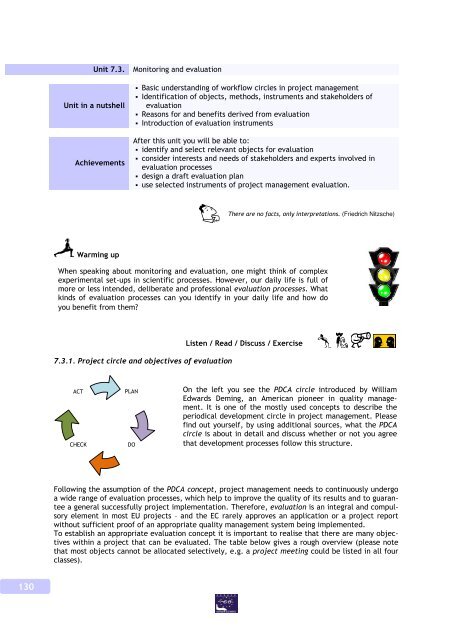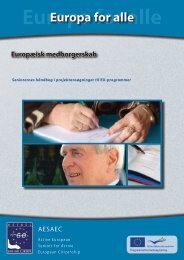We All are Europe - AESAEC
We All are Europe - AESAEC
We All are Europe - AESAEC
You also want an ePaper? Increase the reach of your titles
YUMPU automatically turns print PDFs into web optimized ePapers that Google loves.
Unit 7.3.<br />
Unit in a nutshell<br />
Achievements<br />
Monitoring and evaluation<br />
Basic understanding of workflow circles in project management<br />
Identification of objects, methods, instruments and stakeholders of<br />
evaluation<br />
Reasons for and benefits derived from evaluation<br />
Introduction of evaluation instruments<br />
After this unit you will be able to:<br />
identify and select relevant objects for evaluation<br />
consider interests and needs of stakeholders and experts involved in<br />
evaluation processes<br />
design a draft evaluation plan<br />
use selected instruments of project management evaluation.<br />
There <strong>are</strong> no facts, only interpretations. (Friedrich Nitzsche)<br />
Warming up<br />
When speaking about monitoring and evaluation, one might think of complex<br />
experimental set-ups in scientific processes. However, our daily life is full of<br />
more or less intended, deliberate and professional evaluation processes. What<br />
kinds of evaluation processes can you identify in your daily life and how do<br />
you benefit from them<br />
7.3.1. Project circle and objectives of evaluation<br />
Listen / Read / Discuss / Exercise<br />
ACT<br />
CHECK<br />
PLAN<br />
DO<br />
On the left you see the PDCA circle introduced by William<br />
Edwards Deming, an American pioneer in quality management.<br />
It is one of the mostly used concepts to describe the<br />
periodical development circle in project management. Please<br />
find out yourself, by using additional sources, what the PDCA<br />
circle is about in detail and discuss whether or not you agree<br />
that development processes follow this structure.<br />
Following the assumption of the PDCA concept, project management needs to continuously undergo<br />
a wide range of evaluation processes, which help to improve the quality of its results and to guarantee<br />
a general successfully project implementation. Therefore, evaluation is an integral and compulsory<br />
element in most EU projects – and the EC r<strong>are</strong>ly approves an application or a project report<br />
without sufficient proof of an appropriate quality management system being implemented.<br />
To establish an appropriate evaluation concept it is important to realise that there <strong>are</strong> many objectives<br />
within a project that can be evaluated. The table below gives a rough overview (please note<br />
that most objects cannot be allocated selectively, e.g. a project meeting could be listed in all four<br />
classes).<br />
130









